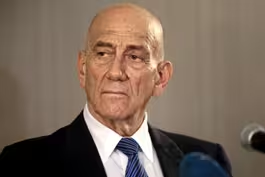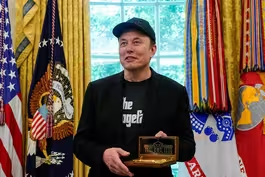
Democratic, Republican mayors team up to address housing
Clip: 6/3/2025 | 7m 48sVideo has Closed Captions
How Democratic and Republican mayors are teaming up to address the housing crisis
A bipartisan group of mayors and business leaders are teaming up to tackle housing and homelessness issues nationwide. They’re meeting as the Trump administration looks to slash assistance programs amid record-high homelessness. Amna Nawaz spoke with two mayors leading the effort, Long Beach, California, Mayor Rex Richardson, a Democrat, and Clearfield, Utah, Mayor Mark Shepherd, a Republican.
Problems playing video? | Closed Captioning Feedback
Problems playing video? | Closed Captioning Feedback
Major corporate funding for the PBS News Hour is provided by BDO, BNSF, Consumer Cellular, American Cruise Lines, and Raymond James. Funding for the PBS NewsHour Weekend is provided by...

Democratic, Republican mayors team up to address housing
Clip: 6/3/2025 | 7m 48sVideo has Closed Captions
A bipartisan group of mayors and business leaders are teaming up to tackle housing and homelessness issues nationwide. They’re meeting as the Trump administration looks to slash assistance programs amid record-high homelessness. Amna Nawaz spoke with two mayors leading the effort, Long Beach, California, Mayor Rex Richardson, a Democrat, and Clearfield, Utah, Mayor Mark Shepherd, a Republican.
Problems playing video? | Closed Captioning Feedback
How to Watch PBS News Hour
PBS News Hour is available to stream on pbs.org and the free PBS App, available on iPhone, Apple TV, Android TV, Android smartphones, Amazon Fire TV, Amazon Fire Tablet, Roku, Samsung Smart TV, and Vizio.
Providing Support for PBS.org
Learn Moreabout PBS online sponsorshipAMNA NAWAZ: A bipartisan group of mayors and business leaders are teaming up to tackle housing issues nationwide.
Mayors and CEOs for U.S. Housing Investment is a public-private partnership that aims to find solutions for a lack of affordable housing in many U.S. cities and towns.
This year, they're meeting as the Trump administration looks to slash rental assistance programs and homelessness hits a record high nationwide.
Joining me now to discuss the effort are two mayors leading the effort.
That's Long Beach, California, Mayor Rex Richardson, a Democrat, and Clearfield, Utah, Mayor Mark Shepherd, a Republican.
Gentlemen, welcome to you both.
REX RICHARDSON (D), Mayor of Long Beach, California: Thank you.
MARK SHEPHERD (R), Mayor of Clearfield City, Utah: Thanks for having us.
AMNA NAWAZ: Thank you for being here.
Mayor Shepherd, so this is a first-of-its-kind bipartisan effort to come up with housing solutions.
What can you accomplish through this model that you couldn't do previously?
MARK SHEPHERD: I think, really, when you're bringing mayors and CEOs together, you're bringing the business community, as well as the municipal leaders together to give a message that it can be done.
None of this gets solved easily.
This is not an easy problem to tackle.
But it's a crucial problem to tackle.
And as you look across the country, you see the desperate need for housing that we have, both on the small scale in our smaller cities and, again, in our bigger cities.
It's everywhere.
And we're short about four million homes.
This allows us to take a message in and solutions and really be able to say, how do we come together to make things happen?
AMNA NAWAZ: So, Mayor Richardson, you're here because you're meeting with federal lawmakers.
REX RICHARDSON: Absolutely.
AMNA NAWAZ: Is this the kind of issue that's best handled through Washington or at the level you work at or at the state level?
REX RICHARDSON: Well, we're implementers on the ground.
We build housing in communities and cities, but we can't do it alone.
We're talking 3.7 million units of housing need to be built in the United States of America.
It's going to require bipartisan leadership on a national level.
And I think what's different about this approach is that you're bringing mayors together from both sides of the aisle, large cities, small cities, and business leaders, because, if you want to support jobs, you can build housing.
If you want to support families, build housing.
It's a bipartisan agenda that we should make a top priority for our country because it supports families.
AMNA NAWAZ: But, of course, what the federal government does impacts both of you on the ground and your constituencies.
Mayor Shepherd, we saw from the White House in the Trump budget outline that, among other things, it would cut HUD rental assistance programs by some $26 billion.
That's a 43 percent cut.
How would that impact folks in Clearfield?
MARK SHEPHERD: It would be catastrophic, to put it very nicely.
We need that assistance throughout Utah.
In my small community, we're 35,000, 36,000 people.
We rely on it.
We're a working-class community.
We're a blue-collar community, manufacturing mostly, and we're an Air Force community.
And so without that assistance, the gap just doesn't get made.
We need that assistance to make things happen.
AMNA NAWAZ: What about you, Mayor Richardson?
REX RICHARDSON: Our city's about a half-a-million residents.
We're a big port town.
We're concerned about housing production to make sure that families of all ages can live with dignity, but also concerned about national conversations on tariffs that affect not only our local economy, but the cost of build.
When we have additional tariffs, it can increase the cost of housing production, which is already expensive.
We believe that we should be moving in the other direction, making housing less affordable to build and more simple to finance.
So investing in working together to expand LIHTC, support more CDBG, reform CDBG home dollars, those are the things we need the federal government to do, while we, on the local level, we look at our own local sources of revenue.
We improve and streamline processes to build housing faster and bring people inside.
AMNA NAWAZ: I assume you meant more affordable to build.
REX RICHARDSON: Absolutely.
AMNA NAWAZ: You said less, but you meant more.
And California is interesting.
I have to ask you, because your governor has really been doing a lot.
He was slashing restrictions and environmental reviews to try to boost some of that housing building.
He also paired billions in state funds to get homeless people into housing and treatment with a real call for cities to shut down the homeless encampments.
There's some division among California Democrats on this.
Is this the right approach, in your view?
REX RICHARDSON: We're a public health jurisdiction in Long Beach, one of only three cities in the entire state with a public health department.
So we do both.
We lead with compassion, but we also acknowledge that we have to build housing and we have to have accountability.
That's what our residents want to see.
And so we believe in housing first.
We have built more shelter and interim housing than we have ever seen in the last five years.
And we're breaking housing records every single year.
But in order to meet the need in Southern California, which is one of the most impacted markets in America, we have to do more.
We have to do it at scale.
We have to streamline environmental reviews.
That's happening in the state level.
There's more that we can do across the country to make sure that we're all hands on deck to address this, this challenge.
AMNA NAWAZ: Mayor Shepherd, hurdles obviously exist in funding at the federal level, but also, locally, sometimes, we see people who live in these communities don't necessarily want to see affordable housing built in those communities.
Do you see that?
And how do you combat it?
MARK SHEPHERD: Sure.
I think we see that everywhere.
We refer to them as NIMBYs, not in my backyard.
I have got the BANANAs as well, to build absolutely nothing or anything anywhere.
They exist, but they don't understand.
There are ways to build housing and have it be dignified.
And that is crucial to this situation, is to build housing that isn't your standard tract housing, isn't your standard affordable, we will call it deeply affordable, that we all view as, oh, that's the low-income stuff.
We just finished a development in Clearfield that's about 400 units of both apartments and townhomes.
And I toured people through there, through the various new developments within the city and said, pick the one that's low-income.
And not one of them could pick this out.
So we went back and toured it, and they said, I cannot believe that this is low-income housing.
It was affordable.
It's the right place, and it's done right.
And it allows people to live with that dignity that they need to without saying, oh, yes, I live in the ghetto or in this deeply affordable housing.
AMNA NAWAZ: I have to ask both of you, because you're teaming up in a bipartisan way on this key issue.
If you could just tell me briefly, from where you sit, where else do you see opportunities for this kind of bipartisan work?
REX RICHARDSON: Well, I will tell you, start where your interests intersect.
Housing, Democrats and Republicans should be able to agree on this.
I will never forget, growing up, we had a two-bedroom apartment.
My mom had a room, my sister and brother shared a room, and I slept on the couch.
We made it work.
We all worked part-time jobs, and I paid the light bill.
My sister paid the phone bill.
We made it work.
But that same apartment today is three to four times as much.
So for a family to pull it together and make ends meet, it's much more difficult for them now.
So we have to make sure that we all focus on this issue so we don't create a catastrophe in our nation.
AMNA NAWAZ: Outside of housing, is there more place for bipartisan work like this?
MARK SHEPHERD: Absolutely.
We're sitting right in the middle of a budget discussion right now, and the House has done their piece and the Senate's doing theirs, and we have got to come together.
We have got to look at where money's being spent, the programs that are being cut, and do them right.
We need to save money.
We understand that.
We get it as a country.
There's things that have to be -- in order to balance a budget or get us to a point where we're not increasing our debt.
But it's how you do that and which things you do.And those are crucial.
We're cutting Job Corps right now.
In fact, we just got word that they're cutting Job Corps.
I have got a Job Corps center in Clearfield.
REX RICHARDSON: Right.
Absolutely.
MARK SHEPHERD: And it's not a, let's ease this through.
It's, we're shutting the doors.
You have got -- they were told, you have got a week.
Send the kids home.
Yes.
AMNA NAWAZ: We're going to have to have you both back to talk about these other cuts and the impact on your constituencies.
Thank you for being here today.
REX RICHARDSON: Thank you.
AMNA NAWAZ: Mayor Rex Richardson and Mark Shepherd, we appreciate your time.
MARK SHEPHERD: Thank you.
Candace Parker on 'The Can-Do Mindset' and finding success
Video has Closed Captions
Clip: 6/3/2025 | 7m 9s | Basketball legend Candace Parker on 'The Can-Do Mindset' and finding success (7m 9s)
Ehud Olmert on why he says Israel is committing war crimes
Video has Closed Captions
Clip: 6/3/2025 | 10m 32s | Former Israeli PM Olmert explains why he believes his country is committing war crimes (10m 32s)
Ex-DOGE staffer: 'I have no idea' who was in charge
Video has Closed Captions
Clip: 6/3/2025 | 7m 35s | Ex-DOGE staffer: 'I have no idea' who was in charge (7m 35s)
Gazans again face gunfire outside humanitarian aid site
Video has Closed Captions
Clip: 6/3/2025 | 3m 54s | More than 2 dozen killed as Gazans again face gunfire outside humanitarian aid site (3m 54s)
Oregon family farm shares South Asian cuisine with community
Video has Closed Captions
Clip: 6/3/2025 | 2m 24s | Family farm in Oregon grows crops to share South Asian cuisine with its community (2m 24s)
Providing Support for PBS.org
Learn Moreabout PBS online sponsorship
- News and Public Affairs

FRONTLINE is investigative journalism that questions, explains and changes our world.

- News and Public Affairs

Amanpour and Company features conversations with leaders and decision makers.












Support for PBS provided by:
Major corporate funding for the PBS News Hour is provided by BDO, BNSF, Consumer Cellular, American Cruise Lines, and Raymond James. Funding for the PBS NewsHour Weekend is provided by...




